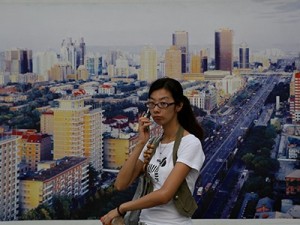This interdisciplinary research project analyses the new cultural geographies of gendered urban space in Delhi and Shanghai, focusing on ‘single’ women across the life-course. The context of neo-liberal urbanisation in India and China is enabling the formation of new biographies and spaces for women. Single women are increasingly visible in public, be it through media representations or everyday practices and mobilities.
Their presence is informed by repertoires of cultural encounter stemming from urban and national histories, globalised media landscapes and flows of capital, concepts and people. Single women in the city have also come to legitimise urban aspirations to cosmopolitanism and Global City-ness.

‘Mobile Media, Gender and the City in China’, picture by Jeroen de Kloet, 2008
Rapidly transforming urban centres such as Delhi and Shanghai, the sites for this research, are the backdrop to changing family patterns and the unravelling of ‘traditional’ social contracts as a result of migration, new work opportunities, delayed marriage, divorce, open homosexuality, and a growing leisure and consumer society. These cities are cultural contact zones, shaping and being shaped by global, regional and national flows. Yet the resulting subjectivities are precarious, marked by asymmetrical power relations reflecting moral panics centred on discourses of ‘westernisation’ and associated perceptions of transgressions of normative gendered comportment and spaces such as the domestic and the public. Gendered imaginaries of emancipation are therefore contested in the light of a variety of cultural practices that impact women’s multiple lifeworlds.
The SINGLE project counts itself as one of the 18 projects selected from over 500 proposals for the 2012 round of the HERA Joint Research Programme held under the theme ‘Cultural Encounters’. The HERA (Humanities in the European Research Area) Joint Research Programme is a partnership between 21 Humanities Research Councils and the European Science Foundation (ESF). The Programme supports innovative collaborations between universities and research centres all across Europe.

Sample poster of Oriental Calender Manufacturing Company, Calcutta, 1940s. Priya Paul Collection, at Tamboti Heidelberg Research Architecture
The project uses ethnographic, mobile and visual methodologies, documenting the experiences of single women in Delhi and Shanghai that are indicative of wider social and demographic transformations. ‘Singleness’ will include temporal and spatial understandings, repositioning it as salient to collective as well as personal identity and experience (e.g. loneliness or independence), and as a phenomenon that women move into and out of across the life-course. The relationship between women’s use of space is set within wider debates of cultural encounter, world cities and globalisation, with subprojects focusing on localised connections between neo-liberal urban transformation and gendered constructions of singleness in the city.
A conceptual framework centred on transcultural analysis links the sub-projects. This approach differs from conceptualisations of global-local encounters as generating multicultural or cosmopolitan spaces. Multi-culturalism recognises cultural difference but confined within distinct and predominantly national boundaries, and cosmopolitanism has been criticised as a celebratory and deterritorialised/-ing notion of universal world citizenship (Brosius & Wenzlhuemer 2011; de Kloet & Jurriens 2007). While valid, both notions can also be critiqued and enriched with the concept of transculturality, underlining oscillating boundaries and fluid cultural spaces and practices best studied in urbanised contexts. Transcultural analysis focuses on sharpening competencies to explore the processes and constructedness of cultural interaction through practices such as gendered space use. It focuses on appropriation and contestation in cultural encounters, in both intra-Asian flows and connections with the Global North.
The project will work with women of different age and social backgrounds accessed through the team’s existing networks in Delhi and Shanghai. The multi-site methodology includes:
(1) Ethnography: diaries; “thick” and multimedia observation and description of research sites and social agents; case-studies of social relations and space use.
(2) Mobile methods: “walk alongs” and mapping (GIS), documenting space use and spatial experience.
(3) Visual methods: photographic elicitation; analysis of media landscapes and media products in which single women feature prominently as a specific social trope.
(4) Digital Humanities: Heidelberg Research Architecture (detailed in Part B).
(5) Collaborative processes: joint field work and writing.